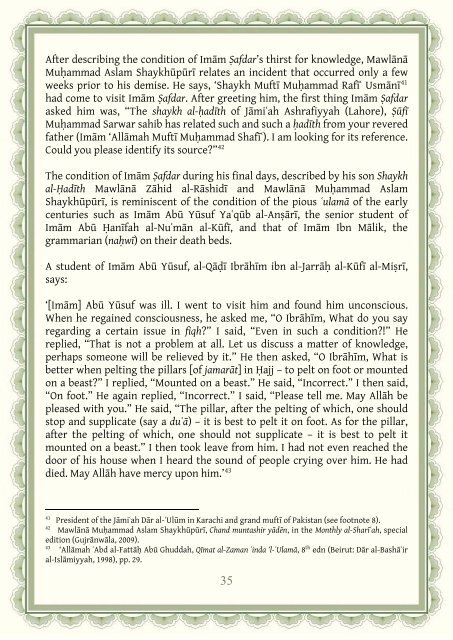Create successful ePaper yourself
Turn your PDF publications into a flip-book with our unique Google optimized e-Paper software.
After describing the condition of Imām Ṣafdar’s thirst for knowledge, Mawlānā<br />
Muḥammad Aslam Shaykhūpūrī relates an incident that occurred only a few<br />
weeks prior to his demise. He says, ‘Shaykh Muftī Muḥammad Rafīʿ Usmānī 41<br />
had come to visit Imām Ṣafdar. After greeting him, the first thing Imām Ṣafdar<br />
asked him was, “The shaykh al-ḥadīth of Jāmiʿah Ashrafiyyah (Lahore), Ṣūfī<br />
Muḥammad Sarwar sahib has related such and such a ḥadīth from your revered<br />
father (Imām ‘Allāmah Muftī Muḥammad Shafīʿ). I am looking for its reference.<br />
Could you please identify its source?” 42<br />
The condition of Imām Ṣafdar during his final days, described by his son Shaykh<br />
al-Ḥadīth Mawlānā Zāhid al-Rāshidī and Mawlānā Muḥammad Aslam<br />
Shaykhūpūrī, is reminiscent of the condition of the pious ʿulamā of the early<br />
centuries such as Imām Abū Yūsuf Yaʿqūb al-Anṣārī, the senior student of<br />
Imām Abū Ḥanīfah al-Nuʿmān al-Kūfī, and that of Imām Ibn Mālik, the<br />
grammarian (naḥwī) on their death beds.<br />
A student of Imām Abū Yūsuf, al-Qāḍī Ibrāhīm ibn al-Jarrāḥ al-Kūfī al-Miṣrī,<br />
says:<br />
‘[Imām] Abū Yūsuf was ill. I went to visit him and found him unconscious.<br />
When he regained consciousness, he asked me, “O Ibrāhīm, What do you say<br />
regarding a certain issue in fiqh?” I said, “Even in such a condition?!” He<br />
replied, “That is not a problem at all. Let us discuss a matter of knowledge,<br />
perhaps someone will be relieved by it.” He then asked, “O Ibrāhīm, What is<br />
better when pelting the pillars [of jamarāt] in Ḥajj – to pelt on foot or mounted<br />
on a beast?” I replied, “Mounted on a beast.” He said, “Incorrect.” I then said,<br />
“On foot.” He again replied, “Incorrect.” I said, “Please tell me. May Allāh be<br />
pleased with you.” He said, “The pillar, after the pelting of which, one should<br />
stop and supplicate (say a duʿā) – it is best to pelt it on foot. As for the pillar,<br />
after the pelting of which, one should not supplicate – it is best to pelt it<br />
mounted on a beast.” I then took leave from him. I had not even reached the<br />
door of his house when I heard the sound of people crying over him. He had<br />
died. May Allāh have mercy upon him.’ 43<br />
41<br />
President of the Jāmiʿah Dār al-ʿUlūm in Karachi and grand muftī of Pakistan (see footnote 8).<br />
42<br />
Mawlānā Muḥammad Aslam Shaykhūpūrī, Chand muntashir yādēn, in the Monthly al-Sharīʿah, special<br />
edition (Gujrānwāla, 2009).<br />
43<br />
‘Allāmah ʿAbd al-Fattāḥ Abū Ghuddah, Qīmat al-Zaman ʿinda ‘l-ʿUlamā, 8 th edn (Beirut: Dār al-Bashāʾir<br />
al-Islāmiyyah, 1998), pp. 29.<br />
35














